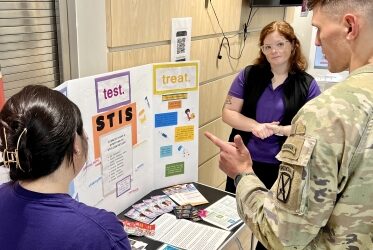After a mild traumatic brain injury (mTBI), military servicemembers who suffer from photophobia, a symptom of visual discomfort in response to normal light levels, often show a decline in photophobia within 30 days of the injury, according to a recent study.
Veterans Receiving Educational Materials, More Likely to Deprescribe Problematic Medications
Sending patient-directed educational materials prior to primary care visits proved to be an effective, low-tech intervention to increase deprescribing of potentially low-value and high-risk medications, according to a new VA study.
Vagus Nerve Stimulation Therapy Is Safe Treatment for Drug-Resistant Epilepsy; Has Risks, However
Vagus nerve stimulation therapy is a safe treatment option for drug-resistant epilepsy over long-term follow-up, but the treatment does have risks, according to a recent study.
Identification of PTSD as a Parkinson’s Disease Risk Factor Could Allow Targeting of Preventive Treatment
VA researchers investigating risk factors for Parkinson’s disease (PD) have identified a strong link between the progressive brain disease and post-traumatic stress disorder (PTSD).
How Anxiety Disorder Can Exist Without ‘Excessive Worry’
Should “excessive worry” be a requirement for a diagnosis of generalized anxiety disorder?
Psychotherapy Beneficial When Veterans With PTSD Have a SUD
Is it beneficial for VA to provide evidence-based psychotherapy (EBP) to veterans with post-traumatic stress disorder and co-occurring substance use disorder?
Legislators Question Why VISN Leaders Were Unaware of Hampton VAMC Problems
Lawmakers are seeking answers to how quality control issues could manifest and then linger at the Hampton, VA, VAMC for years without VISN leaders being aware of them.
Higher Rates of Early Menopause Reported in Women Veterans of the Persian Gulf War
Female military personnel from the Persian Gulf War with probable post-traumatic stress disorder (PTSD) are nearly twice as likely to experience early menopause and related health consequences, according to study results presented at the 2024 Annual Meeting of The Menopause Society in Chicago in September.
Costs of Diabetic Kidney Disease Called ‘Profound’ in the United States
Diabetic kidney disease (DKD) affects about one-third of Type 2 diabetes patients, affecting quality of life and causing significant economic burdens on the healthcare system.
Some Disparities Continue in Veterans Newly Diagnosed With T2D
Racial/ethnic disparities in glycemic control among non-Hispanic Black (NHB) and non-Hispanic white (NHW) veterans with Type 2 diabetes (T2D) have persisted, especially with very poor glycemic control, according to a new study.
Changes in the Use of Incretin-Based Therapies for T2D at the VHA
Incretin-based therapies for the management of Type 2 diabetes (T2D) have become a well-established class of drugs within the VHA, according to a new study.
More Education About Antibiotic Benefits/Risks Can Help Curb Unnecessary Usage
Lack of knowledge of the potential risks of antibiotic use was associated with increased expectations of being prescribed one, according to a new study, which said the lack of awareness is especially great among patients going to public health clinics.
‘Simply the Right Thing to Do’: Behind the VA’s Victory Against HCV in Veterans
In the early 2000s, the VA recognized it had a serious problem. Recent research indicated that veterans were three times more likely to be infected with hepatitis C virus (HCV) than the general population, and Vietnam veterans—the largest cohort in care—bore the brunt of those infections.
Stimulating a Target Brain Circuit Holds Promise for Treating PTSD
Scientists studying post-traumatic stress disorder (PTSD) have been puzzled by several mysteries surrounding the condition, such as why military personnel with severe brain injuries are less likely to develop PTSD compared to those without any brain injury or why a neurostimulation therapy that has proven helpful for other mental health disorders actually worsened PTSD in some studies.
Taxpayers Likely Overpaid by Millions for Veterans Dual Enrolled in the VHA, Medicare Advantage
The federal government appeared to have been massively overpaying for care provided to veterans dually enrolled in VA healthcare and Medicare Advantage plans, according to a new analysis.
DHA Releases Flyer to Educate Servicemembers About Mpox Risk, Protection
In response to the August 2024 upsurge of mpox in the Democratic Republic of Congo and other Africa countries, the Defense Health Agency (DHA) has produced a new flyer: Mpox—What Servicemembers SHOULD KNOW.
The work of epidemiology is related to unanswered questions, but also to unquestioned answers
Pam and I have been hanging out in central Maine at an ancestral lake cabin that has been in Pam’s family for over 100 years. We are fortunate to have this haven to retreat to as our lightning-struck boat/home is being repaired. I like hiking for exercise in the Maine woods, which occasionally necessitates moving through dense vegetation. Following one hike, I broke out in an incredibly itchy rash on my back and chest. It felt like I had rolled around in a field of poison ivy (which I decidedly did not), and the rash seemed to spread to new areas of my body as days passed.
Why Hasn’t More Community Care Improved Veteran Mortality Rates?
In 2014, Congress enacted the Choice Act, followed by the MISSION Act in 2018. Introduced in response to concerns that delays in receiving VA care were negatively impacting veterans, these legislations were designed to simplify the process for veterans to access VA-purchased care.
Unintended Pregnancy Accounts for Loss of Almost 2.5 Million Military-Readiness Days
Almost 45% percent of pregnancies in the United States are unintended, with an estimated 4.5% of reproductive age women having an unintended pregnancy each year.
Discontinuing SGLT2is, GLP-1 RAs Linked to Negative Outcomes in CKD Patients
Discontinuation of sodium-glucose co-transporter-2 (SGLT2) inhibitors and glucagon-like peptide-1 receptor agonists (GLP-1 RA) is common but is associated with harmful outcomes in adults with chronic kidney disease (CKD), according to a recent study.
Overcoming Barriers to Veteran Participation in Outside-VA Cancer Clinical Trials
While clinical trials are essential for advancing treatment options in oncology and making certain patients receive innovative care, too few cancer patients are referred to them, according to a new study.
Care Access Doesn’t Explain Racial Disparities in Rectal Cancer
Does differential access to care explain racial disparities in treatment and outcomes of rectal cancer? A new study from the Uniformed Services University of the Health Sciences suggested that other factors are likely to be at play.
Pandemic Decreased Already Too Low Lung Cancer Screening Rates
A new study demonstrated how critically the COVID-19 pandemic affected lung cancer screening (LCS).
More Point-of-Care Testing in Military Could Help Curb STI Transmissions
Sexually transmitted infections (STIs) affect an estimated 1 in 5 servicemembers, making early diagnosis and treatment important for controlling their spread among this high-risk population.
New Study Warns About Increased Antibiotic Resistance Against Third-Generation Broad-Spectrum Antibiotics in VA Facilities
VHA facilities across the United States have experienced a concerning rise in antibiotic resistance to third-generation cephalosporins, a class of broad-spectrum antibiotics commonly used to treat the Enterobacterales bacterial species.
Indeterminate Liver Nodules Have a High but Variable Risk of HCC
For more than a decade, the Liver Imaging Reporting and Data System (LI-RADS) has been used to standardize the interpretation and reporting of liver lesions in patients at high risk for hepatocellular carcinoma (HCC).
Homelessness Substantially Increases Risk of Death in Veterans With CKD
U.S. veterans with a history of homelessness had a much greater risk of end-stage kidney disease (ESKD) and death, according to a new study, underscoring the role of housing as a social determinant of health.
Faulty Cell Function in Gulf War Illness Likely Caused By Exposure to Hazardous Agents
Veterans suffering from Gulf War illness (GWI), also known as Gulf War Syndrome (GWS), have faulty cell function that is likely caused by intense exposure to hazardous biological and chemical agents during war service, according to a new study.
GLP-1 RAs Promising for Reducing Cirrhosis, Mortality in Liver Disease Patients
Treatment with glucagon-like peptide 1 receptor agonists (GLP-1 RAs) showed promise in lowering the incidence of cirrhosis and mortality in veterans with metabolic dysfunction-associated steatotic liver disease (MASLD) and diabetes, as long as the drug was initiated early in the course of the disease.
Surveys: Better HCC Surveillance Seen as Key to Improved Survival Rates
PALO ALTO, CA — Recent surveys found important gaps in knowledge and perceived barriers to hepatocellular carcinoma (HCC) surveillance in cirrhosis patients in the United States, especially with primary care providers. Even though hepatocellular carcinoma (HCC)...



